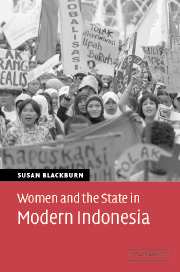Book contents
- Frontmatter
- Contents
- Acknowledgments
- Note on spelling and terminology
- Glossary: abbreviations, acronyms and Indonesian terms
- Introduction
- 1 State gender ideologies and the women's movement
- 2 Education
- 3 Early marriage
- 4 Citizenship
- 5 Polygamy
- 6 Motherhood
- 7 Economic exploitation
- 8 Violence
- Conclusion
- References
- Index
5 - Polygamy
Published online by Cambridge University Press: 22 September 2009
- Frontmatter
- Contents
- Acknowledgments
- Note on spelling and terminology
- Glossary: abbreviations, acronyms and Indonesian terms
- Introduction
- 1 State gender ideologies and the women's movement
- 2 Education
- 3 Early marriage
- 4 Citizenship
- 5 Polygamy
- 6 Motherhood
- 7 Economic exploitation
- 8 Violence
- Conclusion
- References
- Index
Summary
Many Indonesian women have passionately opposed polygamy. Of all the issues canvassed in this book, it is the one that has aroused the greatest depth of feeling among the largest number of Indonesian women. In 1900 Kartini wrote in Java that ‘Almost every woman I know here, curses [the] right that men have’ to take up to four wives (Kartini 1995: 45–6). In 1913 in Minangkabau another woman wrote in equally sombre terms: ‘Polygamy is the poison of the world for us women. There is nothing so painful, so troublesome’ (Soenting Melajoe, 1913: 1). This characterisation of polygamy as poison was common among Indonesian women. In the early 1960s an anthropologist talking to Sasak village women in Lombok found that they were unusually emotional about polygamy. ‘One young woman who had been married for two years related the recurrent nightmares she had about her husband taking another wife, or having another wife and not telling her about it.’ In a society where violence was strongly deprecated, ‘The wife of a village official talked of fighting with her husband's second wife, stating that such conflicts between co-wives were frequent … Another woman said that she dreamed of scratching her co-wife's eyes out.’ Women reported that others had committed suicide or become insane as a result of polygamy (Krulfeld 1986: 204).
Opposition to polygamy has driven Indonesian women to public action on many occasions.
- Type
- Chapter
- Information
- Women and the State in Modern Indonesia , pp. 111 - 137Publisher: Cambridge University PressPrint publication year: 2004

